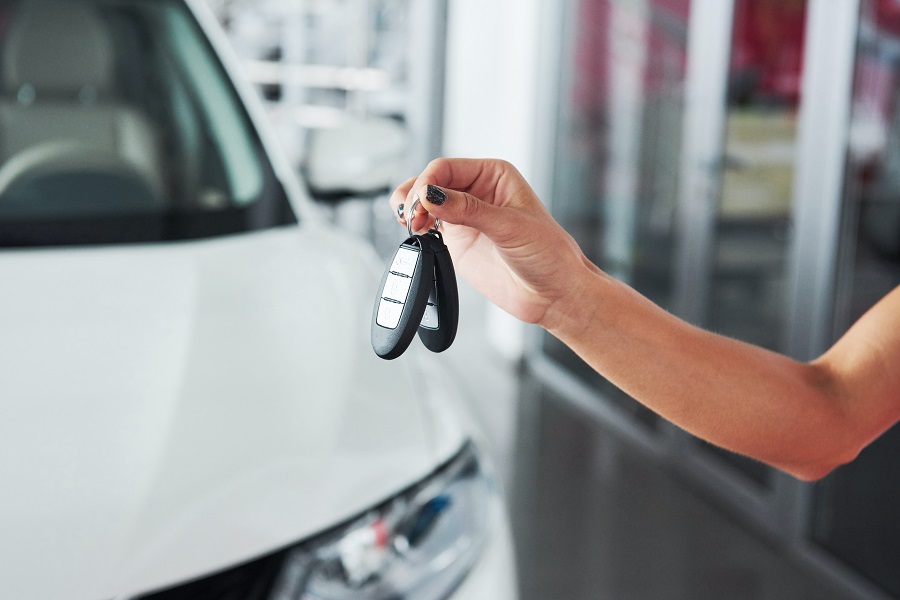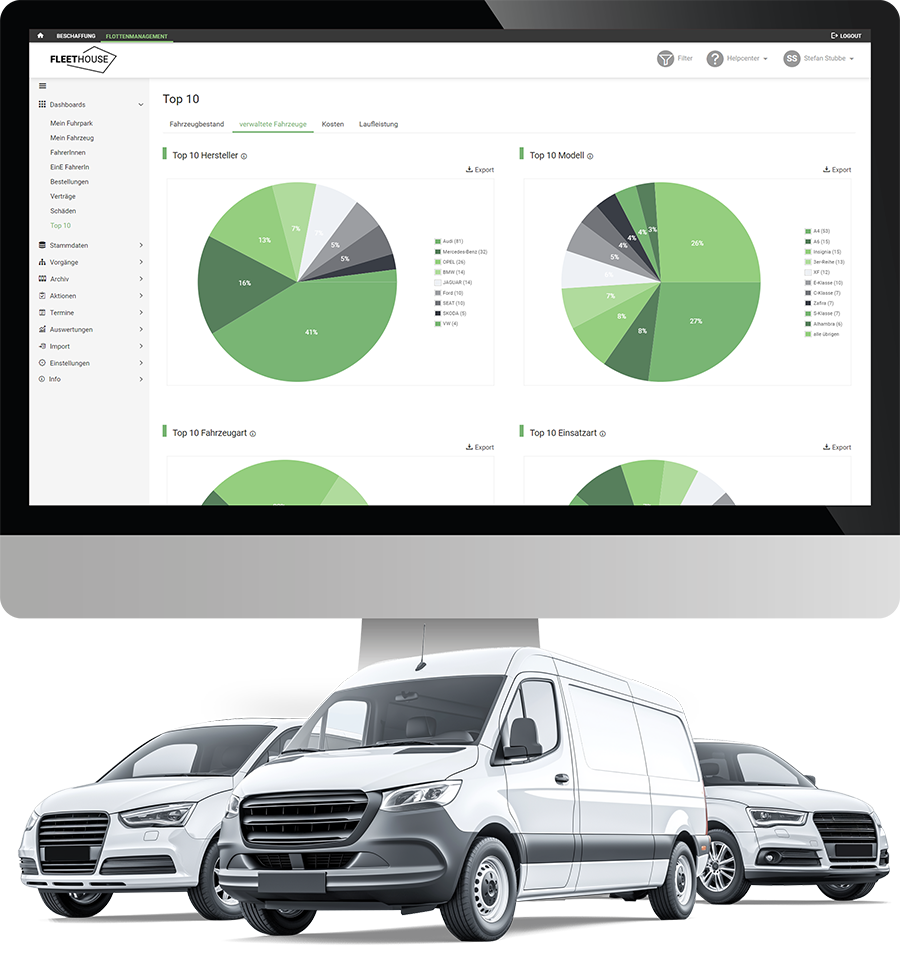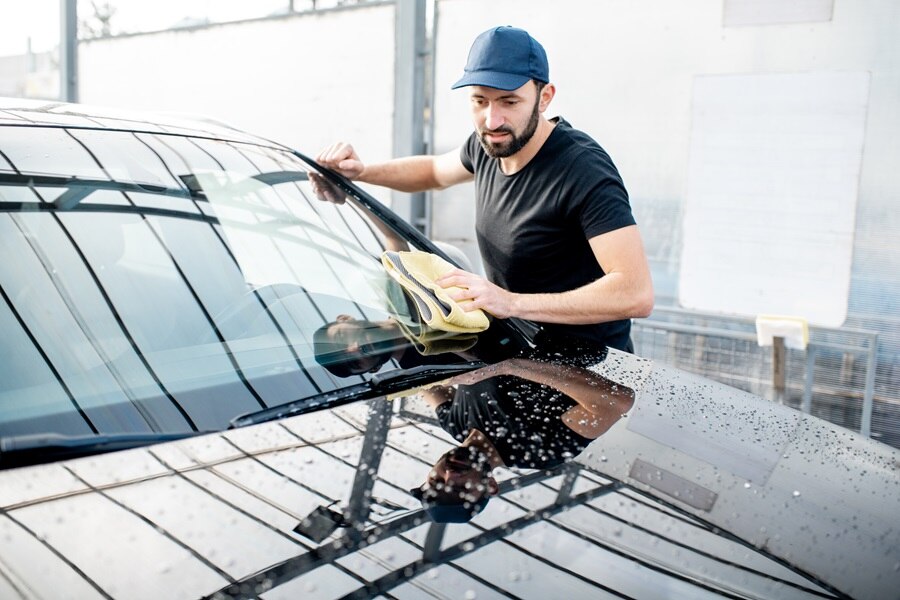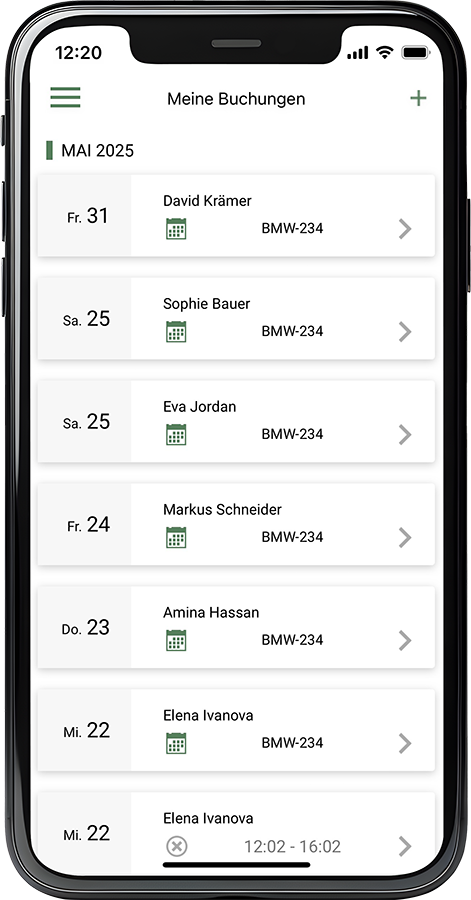Pool vehicles offer both economic and ecological advantages, but their management and maintenance require well thought-out planning and organization– just like classic company cars. Clear guidelines for the use of pool vehicles, regular maintenance and appropriate insurance are crucial. In this article, we give you tips on what is important when managing pool vehicles in your fleet.
Contents
What is a pool car?
A pool vehicle is a company vehicle that can be used jointly by various employees of the company. They use the pool vehicles for trips to customers, suppliers or other business appointments, for example. This concept is also known as corporate car sharing.
In many fleets, traditional company cars have a long service life. Car sharing is a sensible option here, as sharing the pool vehicles can increase their utilization and reduce the number. This reduces fleet costs for acquisition, maintenance, insurance and taxes. In addition, valuable resources are conserved and companies can make a contribution to climate protection.
How many pool vehicles you operate in your fleet depends entirely on your business requirements. In many cases, a car sharing concept complements the classic company car model.
What are the differences between pool vehicles and company cars?
The classic company car is usually linked to a person who can dispose of the vehicle independently. Prior reservation is not necessary. In contrast, pool vehicles are available to several employees.
Not every employee always needs their own company car because, for example, only a few business trips are undertaken or the distances traveled are very short. With car sharing, a vehicle can be booked flexibly and then returned.

5 advantages of pool vehicles in the fleet
Whether higher capacity utilization or cost reduction, pool vehicles offer a number of economic and ecological advantages. Below we take a closer look at the five most important benefits:
Advantage 1: Reduce costs
One of the most important advantages of having pool vehicles in the fleet is the reduction in operating costs. If every employee uses their own company car, fleet management has to bear the costs of purchasing, insurance, fuel and maintenance for each vehicle. Pool vehicles can reduce these costs, which can lead to considerable savings in the fleet.
Advantage 2: Reduction of the ecological footprint
More and more companies are striving to reduce their ecological footprint. Pool vehicles can play an important role in this. If several drivers share a vehicle, the number of vehicles required can be reduced. This makes a lot of ecological sense, as the production of new vehicles is resource-intensive. The CO₂ footprint can be reduced even further with the integration of e-vehicles.
Advantage 3: Flexibility
Pool vehicles offer a great deal of flexibility as they can be used by different drivers. If an employee is on vacation, for example, the pool vehicle is still available to everyone else. This can increase productivity and make the company’s operations more efficient.
In addition, drivers can choose the right pool vehicle to suit their needs without being tied to a specific vehicle. This is particularly useful when different vehicle types are needed for different tasks or requirements.
Benefit 4: Enhanced image and employer attractiveness
Advantage 5: Simplification of administration
If each team member uses their own company car, the company must take over the management and maintenance of each individual vehicle in the fleet. This can be very time-consuming and costly. With fewer pool vehicles, on the other hand, fleet management can simplify the administration and maintenance of vehicles.

How can pool vehicles be organized in the fleet?
A car sharing fleet should be organized carefully and efficiently to ensure smooth operations and increase employee satisfaction. Please note the following points, among others:
Analysis of mobility needs
When introducing pool vehicles in your fleet, the first step should be to analyze the mobility requirements and usage habits of your employees. Take into account both the mobility requirements and the needs of the employees. This will help you find out how utilization is distributed and how many pool vehicles are needed.
Use of a software solution
Managing the pool vehicles with the email provider’s calendar tool quickly reaches its limits and only offers limited functions. Car sharing software such as Fleethouse, on the other hand, provides the complete package for smooth fleetoperations.
Drivers can book a vehicle via a web application or smartphone app and the software assigns a suitable vehicle. Both the leasing kilometers and the range of e-vehicles are taken into account. Reports provide insights into the utilization of the vehicles and how this can be further optimized.

Car sharing made easy
From booking to owner liability to return: Fleethouse has everything you need to organize your pool vehicles.
Define a clear set of rules for use
With the help of a pool vehicle agreement, you define all the rules and obligations for the use of car sharing vehicles in the company. For example, is private use of the pool cars prohibited? Then this should be specified in such an agreement to prevent misunderstandings and conflicts.
In a pool vehicle agreement, you should also specify which employees are allowed to use the pool vehicles, what obligations must be observed and what sanctions apply in the event of violations. All employees who are authorized to use the car sharing vehicles must sign this set of rules. Check and update the guidelines regularly.
Owner liability also for pool vehicles
Whether classic company cars or shared pool vehicles, anyone who makes vehicles available to their employees must also comply with the statutory owner liability obligations as the owner.
In addition to regular driver training in accordance with accident prevention regulations, this also includes checking the validity of driving licenses. Failure to comply with these regulations can result in severe penalties. Digital tools not only help with compliance, but also save a lot of time and minimize organizational effort.
With the help of a smartphone app, drivers can conveniently scan their driving license while on the move. The results are fully documented. Drivers and fleet managers are reminded of upcoming and overdue checks to ensure that no inspection deadlines are forgotten.
The UVV driver training as an e-learning course trains drivers in the safe handling of vehicles and the correct behavior in the event of accidents or adverse weather conditions. The learning content is already fully prepared and ready for immediate access. The test results are also saved here in a comprehensible manner so that you have corresponding proof in the event of a claim.
Instruct employees safely?
Train your drivers at least once a year in the safe handling of vehicles in accordance with UVV. The best way to do this is via e-learning.
Cleaning and maintenance
Regular vehicle maintenance plays a particularly important role for pool vehicles that are often in use and have a high utilization rate. This minimizes the risk of unexpected damage or breakdowns and extends the service life of the pool vehicles. The maintenance intervals vary depending on the vehicle type and are usually specified by the manufacturer. The recommended intervals are noted in the vehicle’s service booklet.
Cleaning the pool vehicles is also extremely important, as they are regularly used by different drivers. A dirty and unkempt car has a negative impact on employee motivation and creates a bad impression at business meetings. Regular cleaning, on the other hand, helps to maintain the value of the pool vehicles and increase driver satisfaction.
A software solution helps to rectify damage to the vehicle as quickly as possible. Drivers can use it to easily document defects and pass them on for further internal processing.

Insurance for pool vehicles in the fleet
Just as with personal company cars, you as the fleet manager must ensure that the pool vehicles are insured accordingly. This includes, in particular, the legally required motor vehicle liability insurance. This covers damage to non-company vehicles and persons if an accident is caused by a company vehicle.
Partial accidental damage insurance covers damage to the company’s own vehicle caused by events such as theft, fire, explosion, glass breakage, storm, hail, lightning or flooding. Fully comprehensive insurance also covers self-inflicted accidents and vandalism.
If you have a large fleet of vehicles, you can consider taking out fleet insurance . This usually offers comprehensive cover for all vehicles in the fleet and often at reduced rates compared to individual insurance.

The complete package for your pool vehicles
Register with Fleethouse and organize your pool vehicles with just a few clicks. You can test all the functions of the car sharing module for 30 days.
Pool vehicle taxation: What needs to be considered when using pool vehicles privately?
Many companies allow their employees to use the pool vehicles for private trips. If private use of the pool vehicles is permitted, this gives employees a non-cash benefit. This can either be taxed using the 1 percent method or by means of a logbook.
With the 1% rule, 1% of the gross list price of the vehicle (at the time of initial registration) is added to the taxable salary. With the pool vehicle tax, however, the non-cash benefit is distributed among all employees who use the vehicle.
If the pool vehicle may be used to travel between home and work, the non-cash benefit must also be taxed. For this purpose, 0.03% of the gross list price per kilometer of travel is deducted from the gross salary.
Alternatively, employees can keep a logbook for pool vehicle taxation. All kilometers driven are noted in this logbook. This method is particularly advantageous for drivers who rarely make private journeys with pool vehicles.
Arrange an online consultation appointment
Arrange your personal consultation appointment now. You can easily select a suitable appointment using our booking tool.

Anne Fuchs

Ciara Lazeta
The most important facts about pool vehicles in the fleet
Lay down all the rules regarding the use of the vehicles in a pool vehicle agreement. In this way, you create a clear, binding set of rules and prevent conflicts.
Pool vehicles should be cleaned and serviced regularly to avoid unnecessary and expensive repairs and to ensure that the vehicles are safe to operate.
Regularly check the driving licenses of all employees and instruct them in the safe handling of the pool vehicles.
Further Fleet Knowledge
If you liked this article and would like to know more about this topic, we recommend these articles.

Corporate car sharing: advantages and tips for your company

This belongs in a pool vehicle agreement



